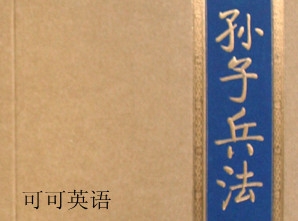军争篇 NO.4:
《军政》曰:言不相闻,故为之金鼓;视不相见,故为之旌旗。
夫金鼓旌旗者,所以一人之耳目也。
人既专一,则勇者不得独进,怯者不得独退,此用众之法也。
故夜战多火鼓,昼战多旌旗,所以变人之耳目也。
这句啥意思:
《军政》说:“在战场上用语言来指挥,听不清或听不见,所以设置了金鼓;用动作来指挥,看不清或看不见,所以用旌旗。
金鼓、旌旗,是用来统一士兵的视听,统一作战行动的。
既然士兵都服从统一指挥,那么勇敢的将士不会单独前进,胆怯的也不会独自退却。这就是指挥大军作战的方法。
所以,夜间作战,要多处点火,频频击鼓;白天打仗要多处设置旌旗。这些是用来扰乱敌方的视听的。
英文这么说:
The Book of Army Management says: On the field of battle, the spoken word does not carry far enough:hence the institution of gongs and drums. Nor can ordinary objects be seen clearly enough: hence the institution of banners and flags.
Gongs and drums, banners and flags, are means whereby the ears and eyes of the host may be focused on one particular point.
The host thus forming a single united body,is it impossible either for the brave to advance alone,or for the cowardly to retreat alone. This is the art of handling large masses of men.
In night-fighting, then, make much use of signal-fires and drums, and in fighting by day, of flags and banners,as a means of influencing the ears and eyes of your army.

中国古船上的旌旗












